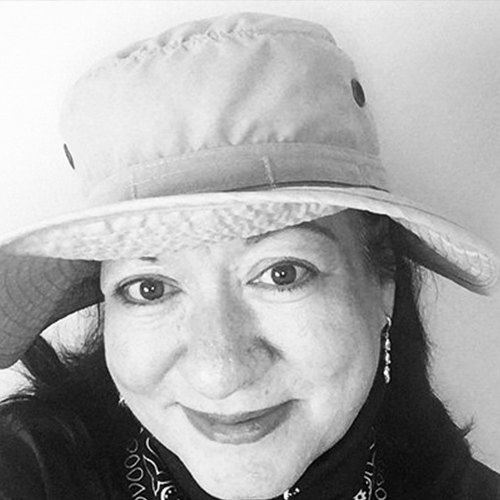Often students will interrupt their college careers to take a break, make some money, or have a baby.
Myrna Bonin did all three. After leaving Rutgers as a freshman in 1977, Bonin plunged into a new career in health care. She spent more than 20 years as a paramedic. She raised a son. She had a whole life. But something was missing. So she went back to school.
First, Bonin got her associate’s degree at Brookdale Community College. Then, in 2019, she continued her studies through Rutgers Statewide at Brookdale. She just graduated with a B.A. in Journalism and Media Studies.
“If I can do it, anyone can do it. And for women especially, I think it’s important to know that. It’s never too late. If there’s a problem, look for the solution.”
The Rutgers Statewide program can be a great solution.
Some students may not have the time, or resources, to return to school full-time, let alone live on campus. Some, like Bonin – based in Middletown – might find a regular commute to Newark, New Brunswick, or Camden, difficult to manage.
Through Statewide, however, students attend nearby community colleges while taking classes taught by Rutgers faculty. When they graduate, it’s with a Rutgers degree.
“The program is a real gift to students,” she says.
“Myrna is sort of why we’re here. A lot of students are location-bound, because of the distance, the commute — I mean, have you seen the traffic on 287? But the Statewide program moves a Rutgers degree into people’s backyards.”
– Joseph Walsh, Assistant Director, Off-Campus Programs at Rutgers Division of Continuing Studies.
Walsh says most Statewide students are in their early 20s, attending full-time. A sizable number, however, are older, coming back to complete a degree or “upgrade their credentials for career opportunities,” he says.
“When we talk to students about why they’re returning, ‘career options’ is in the Top 5,” Walsh says. “But often the answer is, `I want to finish something I started’ or ‘I’m doing this for myself.’ It’s a personal achievement. And that shows in Myrna’s motivation, and her dedication. It’s not easy going back to college when your last class was during the Carter administration.”
That’s when Bonin started her Rutgers journey, as a journalism student. But “life events” intervened. “That first year was a disaster,” she says. “And I needed to become independent anyway.” She dropped out.
After volunteering at a hospital in Elizabeth, she trained to become an EMT, eventually working with paramedic and burn transport units, including at Saint Barnabas and Overlook. She spent 15 years working for Newark EMS, and remembers plenty of gruesome cases, from a man hit and dragged by a car to a 4-year-old who’d been beaten to death.
“You deal with it later,” she says, “in whatever way you deal with it. But you don’t break down then. You can’t. It’s not your time to break down, it’s your time to advocate for that patient. You know, it’s ironic, because in high school I pricked my finger in bio and fainted. But for some reason I can handle seeing other people’s blood.”
After she turned 40, Bonin began exploring returning to school.
“It was an in-and-out process,” she admits. “It was difficult. I had a son – I remember bringing him to classes at Brookdale, when he was little. He’s in college now! Things would get in the way, years would go by. But in 2018, I enrolled at Brookdale again, and just kept going. I thought, I’m not stopping this time. And in 2019 I started working on my bachelor’s.”
There were further obstacles ahead. Bonin struggled with a bout of Covid. She was taking her classes online, and when her laptop died, she had to try to do everything on her phone. Her mother, now 90, grew frail, requiring Bonin to travel down to Florida to take care of her.
“I would sit by her bed for hours, and tell her about my courses,” Bonin says. “I found out I had relatives who had once been journalists in Santiago.”
Despite the challenges, Bonin persevered. She ended up receiving the Yolande Rubianes Memorial Award from the Office of Student Services, Rutgers School of Arts and Sciences-Newark, given to students who distinguish themselves while overcoming adversity.
“Myrna is the real deal. She’s willing to put in the work and the time; her writing is beautiful and she’s easy to talk to, so she go some great interviews. She was the perfect student, and a great partner — having her in class felt like a collaboration. I know she’s going to make a difference in whatever she does.”
“Myrna was a terrific student,” echoes Shauna Shames, an associate professor of political science at Rutgers-Camden. “She was so engaged with the material, and had a wealth of life experience to share with the younger and less experienced students. She’s a classic example of why I love having returning students in with the more traditional undergraduates.”
If anything, finishing her degree has only increased Bonin’s love of knowledge. Her outside interests include everything from boating to robotics; her causes include promoting STEM education. She recently became “ridiculously enamored” of legal philosophy, and now attends online seminars from around the world.
Her next goal? She’s already taken the LSATs, so law school is a distinct possibility – she’d love to become a professor. An eventual doctorate in journalism is another dream, too. A lot, she explains, depends on where she gets in.
“So I’m not sure where I’ll be in September,” she says. “Except in school, working towards my next degree.”
 Bookstore
Bookstore  Self Service
Self Service  Video Library
Video Library 
